ADVOCATING FOR A JUST FEDERAL BUDGET: On Sept. 30, Congress passed a resolution that will fund the federal government until Dec. 11. However, this resolution does not provide necessary increases in funding to address our concerns for environmental issues or vulnerable people. Now, budget talks continue and there is an opportunity once again to influence our members of Congress as they debate how to fund the government for the remainder of the fiscal year ending on Sept. 30, 2016.
In the next few months we will continue to raise our voices in support of a budget that honors our earth and the well-being of all around the world. This includes funding for the Green Climate Fund, health and refugee services, emergency food assistance, and other programs that enhance the lives of families in the U.S. and abroad. Continue to check your inbox for opportunities to join us and faith communities around the country in urging Congress to pass a faithful budget.
LUTHERAN AND EPISCOPAL CHURCH LEADERS’ OPINION COLUMN FEATURED IN USA TODAY: Presiding Bishop Eaton joined leaders of Lutheran and Episcopal churches in Canada and the United States to write an opinion column on uniting to safeguard God’s Creation that was featured in USA Today on September 23. The church leaders described that “our traditions drive us to address the interrelated problems of climate change, environmental degradation, hunger and poverty… Though we represent different religious institutions, we share a common goal, and recognize that time is short to achieve it. We all know that to protect the poorest we must protect the climate.” This piece was published during Pope Francis’ visit to the U.S.
____________________
New York, NY
Dennis Frado, Lutheran Office for World Community
SITUATION IN THE CENTRAL AFRICAN REPUBLIC: The Lutheran Office for World Community has been following the situation in the Central African Republic (CAR) very closely. On Sept. 26, an upsurge in violence occurred in the previously relatively stabilized capital of Bangui. Only four days prior, a meeting between the U.N. Department of Peacekeeping Operations (DPKO) and nongovernmental organizations highlighted the positive outcomes of the people-centric National Forum in Bangui, which adopted the Republican Pact for Peace, National Reconciliation and Reconstruction. These outcomes, especially free and fair national and legislative elections scheduled for October 2015, have become a high-priority for U.N. agencies, including the Security Council, DPKO and the U.N. Development Programme. However, violence in the country’s capital in the recent days has led CAR’s interim transitional president, Catherine Samba-Panza, to postpone the previously scheduled October elections. In a high-level U.N. meeting on CAR held on Oct. 1, U.N. Secretary-General Ban Ki-moon urged member states to give financial contributions to CAR to fund the priorities of the Bangui Forum and to rally the support of the international community. As for the role of faith-based organizations in CAR, DPKO urges spaces of faith and worship to also be vehicles for reconciliation among marginalized and oppressed peoples. Additionally, The Lutheran World Federation and nine other nongovernmental organizations drafted and signed an advocacy memorandumoutlining the problems in CAR and recommending solutions. For more information on the situation in CAR, read here.
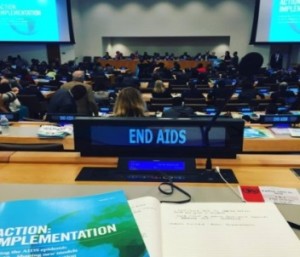 OUTLOOK OF THE HIV AND AIDS EFFORTS AT THE UNITED NATIONS: During the 70th Session of the U.N. General Assembly, Nicholas Jaech with the Lutheran Office for World Community joined activists, health workers and governments to discuss long-term commitments to ending HIV and AIDS by 2030 – an objective outlined in the Fast-Track strategy developed byUNAIDS. On Sunday, Sept. 27, a meeting between UNAIDS and civil society was held to discuss the financial realities of achieving this goal. UNAIDS admitted a $10 billion to $15 billion global shortfall in funds necessary to successfully implement the Fast-Track strategy. On the same day, a high-level event, “Ending the AIDS Epidemic by 2030: Shaping New Models and Means of Implementation,” was hosted by the governments of Kenya and Malawi, in partnership with UNAIDS. At this event, the governments of Malawi, Kenya, Mali, Lesotho, Saint Kitts and Nevis, and the United States pledged their support for the Fast-Track strategy. All governments that spoke highlighted the need to focus on adolescent girls, who are eight times more likely than men to be HIV positive. These governments also acknowledged the importance of concentrated efforts to support and de-stigmatize marginalized groups, specifically men who have sex with men, sex workers, and drug users. For more information on ELCA efforts concerning HIV and AIDS, click here. Additionally, follow them on Facebook and on Twitter at@ELCAHIVandAIDS.
OUTLOOK OF THE HIV AND AIDS EFFORTS AT THE UNITED NATIONS: During the 70th Session of the U.N. General Assembly, Nicholas Jaech with the Lutheran Office for World Community joined activists, health workers and governments to discuss long-term commitments to ending HIV and AIDS by 2030 – an objective outlined in the Fast-Track strategy developed byUNAIDS. On Sunday, Sept. 27, a meeting between UNAIDS and civil society was held to discuss the financial realities of achieving this goal. UNAIDS admitted a $10 billion to $15 billion global shortfall in funds necessary to successfully implement the Fast-Track strategy. On the same day, a high-level event, “Ending the AIDS Epidemic by 2030: Shaping New Models and Means of Implementation,” was hosted by the governments of Kenya and Malawi, in partnership with UNAIDS. At this event, the governments of Malawi, Kenya, Mali, Lesotho, Saint Kitts and Nevis, and the United States pledged their support for the Fast-Track strategy. All governments that spoke highlighted the need to focus on adolescent girls, who are eight times more likely than men to be HIV positive. These governments also acknowledged the importance of concentrated efforts to support and de-stigmatize marginalized groups, specifically men who have sex with men, sex workers, and drug users. For more information on ELCA efforts concerning HIV and AIDS, click here. Additionally, follow them on Facebook and on Twitter at@ELCAHIVandAIDS.
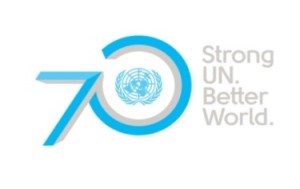 U.N. TURNS 70 AND DISCUSSES REFORMS: The United Nations celebrates its 70thanniversary in October. During the annual General Debate in September, many heads of state used this anniversary occasion to highlight the achievements of the United Nations regarding its three pillars – peace and security, development, and human rights. Nevertheless, voices also gained momentum demanding reforms of current U.N. structures. A growing number of countries support the French-Mexican initiative to encourage the permanent five members of the Security Council (China, France, the United Kingdom, Russia and the United States) to refrain from using the veto in cases of mass atrocities. A similar project was launched by the ACT-Group (Accountability, Coherence, and Transparency). About 60 countries signed a Code of Conductpledging not to vote against any drafts that would deter international action on genocide, crimes against humanity or war crimes. Additionally, many member states demand a more transparent and diplomatic process of the selection, nomination and appointment of the next secretary-general, who will follow Ban Ki-moon in 2017. Many members of civil society supported this demand by joining the 1 for 7 Billion Campaign.
U.N. TURNS 70 AND DISCUSSES REFORMS: The United Nations celebrates its 70thanniversary in October. During the annual General Debate in September, many heads of state used this anniversary occasion to highlight the achievements of the United Nations regarding its three pillars – peace and security, development, and human rights. Nevertheless, voices also gained momentum demanding reforms of current U.N. structures. A growing number of countries support the French-Mexican initiative to encourage the permanent five members of the Security Council (China, France, the United Kingdom, Russia and the United States) to refrain from using the veto in cases of mass atrocities. A similar project was launched by the ACT-Group (Accountability, Coherence, and Transparency). About 60 countries signed a Code of Conductpledging not to vote against any drafts that would deter international action on genocide, crimes against humanity or war crimes. Additionally, many member states demand a more transparent and diplomatic process of the selection, nomination and appointment of the next secretary-general, who will follow Ban Ki-moon in 2017. Many members of civil society supported this demand by joining the 1 for 7 Billion Campaign.
POST-2015 DEVELOPMENT AGENDA; 2030 AGENDA FOR SUSTAINBLE DEVELOPMENT: On Sept. 25, more than 150 heads of 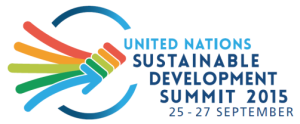 state convened for the United Nations Sustainable Development Summit 2015 and adopted the 2030 Agenda for Sustainable Development, Transforming Our World, which is “a plan of action for people, planet and prosperity.” The Global Goals, as they are called in a recently launched campaign, consist of 17 new sustainable development goals and 169 targets. LOWC has been monitoring the negotiations and will continuing to follow the implementation phase including the development of target indicators by 2016 and the establishment of review mechanisms.
state convened for the United Nations Sustainable Development Summit 2015 and adopted the 2030 Agenda for Sustainable Development, Transforming Our World, which is “a plan of action for people, planet and prosperity.” The Global Goals, as they are called in a recently launched campaign, consist of 17 new sustainable development goals and 169 targets. LOWC has been monitoring the negotiations and will continuing to follow the implementation phase including the development of target indicators by 2016 and the establishment of review mechanisms.
____________________
LOWC Advocacy Blog
Nicholas Jaech, Lutheran Office for World Community
THE CULTURE OF PEACE: This month, Nicholas Jaech reflects on recent developments at the United Nations and the culture of peace in his blog, “Reconciling a Culture of Peace and a Responsibility to Protect.”
“I have been overwhelmed with admiration for how active faith-based groups are at the United Nations. Social justice is at the forefront of all conversations, faith is shared, and ecumenical working groups have formed to promote peace in its many forms – climate justice, gender justice, and hunger relief, just to name a few. These groups, many ecumenical and inter-faith, illustrate how justice and peace can be created in an ever-increasingly diverse world.” Read the full version at the ELCA Advocacy Blog!
____________________
California
Mark Carlson, Lutheran Office of Public Policy
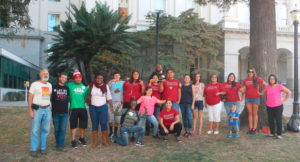 After the DC Advocacy Convening and a stop in Kansas for The Land Institute’s Prairie Fest that included theologians Mary Evelyn Tucker of Yale and John Cobb of Claremont, LOPP-CA director Mark Carlson arrived in Sacramento after flight delays for a press event promoting AB 47, a bill that would move California toward serving all children from low-income families with state preschool by 2018. The bill is sitting on Gov. Brown’s desk with an Oct. 11 deadline for signature. Due to circumstances beyond his control, Mark was unable to respond to an invitation from Brown’s office to participate in the Los Angeles signing ceremony for SB 350, which sets the goal of doubling energy efficiency in all buildings, and producing half our electricity with renewable sources, by 2030. Mark also joined a closing Saturday afternoon prayer circle on the day that Gov. Brown signed AB 953, a bill that seeks to reduce racial and identity profiling by law enforcement through expanded training, data gathering, and an
After the DC Advocacy Convening and a stop in Kansas for The Land Institute’s Prairie Fest that included theologians Mary Evelyn Tucker of Yale and John Cobb of Claremont, LOPP-CA director Mark Carlson arrived in Sacramento after flight delays for a press event promoting AB 47, a bill that would move California toward serving all children from low-income families with state preschool by 2018. The bill is sitting on Gov. Brown’s desk with an Oct. 11 deadline for signature. Due to circumstances beyond his control, Mark was unable to respond to an invitation from Brown’s office to participate in the Los Angeles signing ceremony for SB 350, which sets the goal of doubling energy efficiency in all buildings, and producing half our electricity with renewable sources, by 2030. Mark also joined a closing Saturday afternoon prayer circle on the day that Gov. Brown signed AB 953, a bill that seeks to reduce racial and identity profiling by law enforcement through expanded training, data gathering, and an 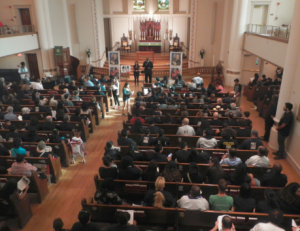 advisory board. The bill’s outcome was very much in doubt, with 24/7 vigilers prepared to launch a hunger strike, “Starved for justice,” the following Monday. LOPP-CA worked with PICO California to secure St. John’s Lutheran Church for a Sept. 2 briefing, with prayers, music, and blessing, which filled the sanctuary prior to a march to the Capitol that drew 1,000.
advisory board. The bill’s outcome was very much in doubt, with 24/7 vigilers prepared to launch a hunger strike, “Starved for justice,” the following Monday. LOPP-CA worked with PICO California to secure St. John’s Lutheran Church for a Sept. 2 briefing, with prayers, music, and blessing, which filled the sanctuary prior to a march to the Capitol that drew 1,000.
Upcoming events include the Sierra Pacific Synod’s annual hunger gathering, featuring ELCA World Hunger’s Ryan Cumming, and a water tour to East Porterville.
____________________
Colorado
Peter Severson, Lutheran Advocacy Ministry – Colorado
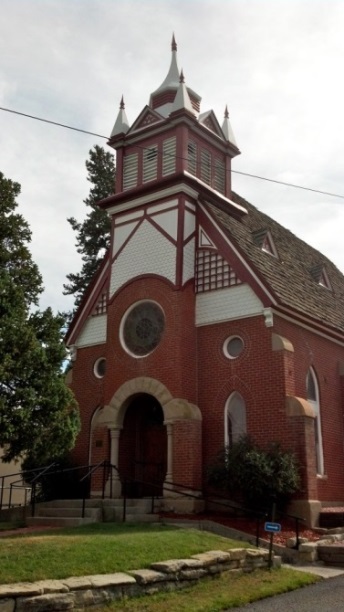 ELCA ADVOCACY CONVENING: Alongside bishops, community leaders, and other state public policy office directors, LAM-CO Director Peter Severson was in Washington, D.C., for the ELCA Advocacy Convening. After watching Pope Francis’ address to a joint session of Congress from a streaming video feed in the Dirksen Senate Office Building, Peter joined LAM-NM Director Ruth Hoffman and Denver-based community leader Joy Waughtal in visiting congressional offices on Capitol Hill. Productive meetings were held with staffers for Sen. Cory Gardner, Colo., Sen. Tom Udall, N.M., and Rep. Ed Perlmutter, Colo. Peter and Ruth also acted as envoys for Rocky Mountain Synod Bishop Jim Gonia, offering personal greetings to Rep. Cynthia Lummis, Wyo., at the ELCA Advocacy Prayer Brunch (pictured right).
ELCA ADVOCACY CONVENING: Alongside bishops, community leaders, and other state public policy office directors, LAM-CO Director Peter Severson was in Washington, D.C., for the ELCA Advocacy Convening. After watching Pope Francis’ address to a joint session of Congress from a streaming video feed in the Dirksen Senate Office Building, Peter joined LAM-NM Director Ruth Hoffman and Denver-based community leader Joy Waughtal in visiting congressional offices on Capitol Hill. Productive meetings were held with staffers for Sen. Cory Gardner, Colo., Sen. Tom Udall, N.M., and Rep. Ed Perlmutter, Colo. Peter and Ruth also acted as envoys for Rocky Mountain Synod Bishop Jim Gonia, offering personal greetings to Rep. Cynthia Lummis, Wyo., at the ELCA Advocacy Prayer Brunch (pictured right).
CHILD NUTRITION: LAM-CO was represented at the Hungry for Change Summit 2015, hosted by Hunger Free Colorado. Many critical partners in anti-hunger advocacy and relief attended the conference, whose keynote speaker was Joel Berg, executive director of the New York City Coalition Against Hunger. Advocates are still working with members of Congress to ensure the safe renewal of funding for key anti-hunger programs in child nutrition, including school breakfasts, summer meal programs, and WIC.
____________________
Illinois
Jennifer DeLeon, Lutheran Advocacy – Illinois
We are now going into the fourth month without a budget! Every day there are people who are going without critical services because providers have had to lay off staff or close their doors entirely.
ACT NOW: Tell your state representative to vote for SB 2046, which funds critical services for Illinois’ most vulnerable citizens and enables the social safety net to remain intact. The bill was approved by the Senate in early September and would give the governor authority to make payments to human services providers not already funded pursuant to court orders. Click here for more information on the bill and to take action!
CERTIFICATE OF GOOD CONDUCT: HB 3475 We also have some good news to share! A bill we worked on was signed into law. HB 3475 expands the eligibility for Certificates of Good Conduct to include people who have committed non-sex-related forcible felonies so that people who have made grave mistakes have at least one avenue beyond clemency to demonstrate they’ve turned their lives around. They may petition the court to receive one of these certificates, which can help them obtain employment or licensure. This and other bills are part of the work we are doing in coordination with the Office of Racial Justice to continue to bring awareness to the criminal justice social statement and provide concrete ways people can take action!
____________________
Minnesota
Tammy Walhof, Lutheran Advocacy – Minnesota
NEXT YEAR’S PRIORITIES: Since the 2016 legislative session will be only 2.5 months long, the LA-MN Policy Council decided to focus on constituent education, while being prepared to act on a few key issues.
PRIMARY EDUCATIONAL FOCUS: Creation Care, especially climate concerns and clean energy, through frames of 1) global poverty, 2) low income in the state and nation, and 3) clean, accessible water.
NIMBLE ACTION/EDUCATION FOCI:
Payday lending reform: LA-MN has worked on this in the past, and five Minnesota synods have payday resolutions. An ELCA congregation also started a lending program to help people get out from under payday loans.
Affordable housing and homelessness: LA-MN continues active participation in the Homes for All Coalition. The “ask” is still being decided and could include bonding, homeless youth, senior homelessness, families with children, discrimination against people of color, etc..
IMMIGRATION: Lutheran Social Service of Minnesota reports that resettlement of immigrants and refugees is facing pushback in some Minnesota communities. LA-MN will work to change the narrative toward “welcoming the stranger.” LA-MN will also be ready to lend support to state or federal efforts related to immigration and refugees.
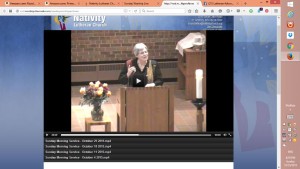 ELCA/EPISCOPAL ADVOCACY CONVENING: The convening included numerous speakers, the congressional address by Pope Francis via streaming video to a Senate office building, and advocacy. Representing Minnesota were Bishop Steve Delzer (Southeastern Minnesota Synod), the Rev. Margaret Kelly (Shobi’s Table), and LA-MN Director Tammy Walhof, who met with Rep. Tim Walz, Sen. Amy Klobuchar, and staff from the offices of Sen. Al Franken, and Rep. John Kline.
ELCA/EPISCOPAL ADVOCACY CONVENING: The convening included numerous speakers, the congressional address by Pope Francis via streaming video to a Senate office building, and advocacy. Representing Minnesota were Bishop Steve Delzer (Southeastern Minnesota Synod), the Rev. Margaret Kelly (Shobi’s Table), and LA-MN Director Tammy Walhof, who met with Rep. Tim Walz, Sen. Amy Klobuchar, and staff from the offices of Sen. Al Franken, and Rep. John Kline.
Twitter: @LuthAdvocacyMNFacebook
____________________
New Jersey
Sara Lilja, New Jersey Synod
LEAMNJ is working to override the Governor’s veto of bill (S2360). This legislation was drafted because the courts here in NJ asked for additional support when making decisions about expungement cases. Simply, local, county and state law enforcement officers to be alerted when people with a history of serious mental illness ask a judge to expunge their record of psychiatric treatment so they may buy a firearm. The bill would provide judges with relevant information regarding a person’s history when they are making important decisions on the expungement of records. This legislation could impact public safety and the safety of the petitioner.
Our challenge is that the NJ legislature has not been able/willing to override a single veto since this Governor has been in office. We are currently mobilizing congregational members, and many have responded! Visits, calls, and emails- the push is on in NJ to help prevent gun violence!
____________________
New Mexico
Ruth Hoffman, Lutheran Advocacy Ministry – New Mexico
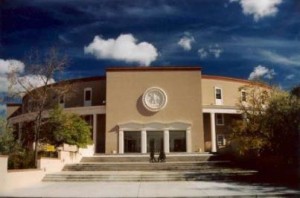 LAM-NM recently led a forum at Our Savior Lutheran Church in Alamogordo, N.M. The forum explored poverty in New Mexico (which has among the highest rates of poverty in the nation) by putting together a household budget for a family
LAM-NM recently led a forum at Our Savior Lutheran Church in Alamogordo, N.M. The forum explored poverty in New Mexico (which has among the highest rates of poverty in the nation) by putting together a household budget for a family 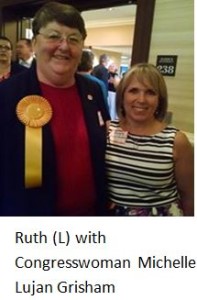 that was headed by someone earning the New Mexico’s minimum wage of $7.50 per hour. The participants estimated the cost of housing, transportation, food, child care, health care, taxes and other expenses. The group quickly concluded that those costs were much more than the gross income of $1,300 per month. They discussed possible public policies that could address that income gap, such as increasing the minimum wage and making more affordable housing available.
that was headed by someone earning the New Mexico’s minimum wage of $7.50 per hour. The participants estimated the cost of housing, transportation, food, child care, health care, taxes and other expenses. The group quickly concluded that those costs were much more than the gross income of $1,300 per month. They discussed possible public policies that could address that income gap, such as increasing the minimum wage and making more affordable housing available.
LAM-NM Director Ruth Hoffman was honored as one of 20 leaders in state health care advocacy by Health Action-New Mexico. The recognition was given at a dinner at which Ron Pollack of Families USA was the keynote speaker. Ruth was congratulated by U.S. Rep. Michelle Lujan Grisham.
____________________
Ohio
Nick Bates, The Faith Coalition for the Common Good
As a person of faith, I want our elected officials to focus on ending hunger, reducing poverty, and working to improve our communities. I believe Ohio can accomplish these things only when elected officials are responsive to the needs of their constituencies. That is why I am voting YES on ISSUE 1.
When we have fair districts we will have fair elections. A yes vote on Issue 1 will improve the district drawing process, and encourage elected officials to be more responsive to the needs of their communities. Proverbs 31 calls us to speak up for the oppressed. Issue 1 will give all Ohio voters an opportunity to speak up for themselves and make a difference through the electoral process.
Our communities matter and elected officials are charged to represent our needs at the Statehouse in Columbus. Gerrymandering has weakened the voice of the voter and strengthened the voice of money, lobbyists, and ideology. Issue 1 will reform our system to bring the voters back to the center of Ohio’s Statehouse. It is our prayer that Issue 1 will pass on November 3rd and it will be successful in improving the People’s House in Columbus.
____________________
Pennsylvania
Amy Reumann, Lutheran Advocacy Ministry in Pennsylvania
Tracey DePasquale, Associate Director
LAMPa advocacy helped lead Gov. Tom Wolf to address the serious problem of hunger and inadequate nutrition; he issued an executive order to coordinate Pennsylvania’s food and nutrition programs and revive a hunger strategy for Pennsylvania!Read more about this advocacy success!
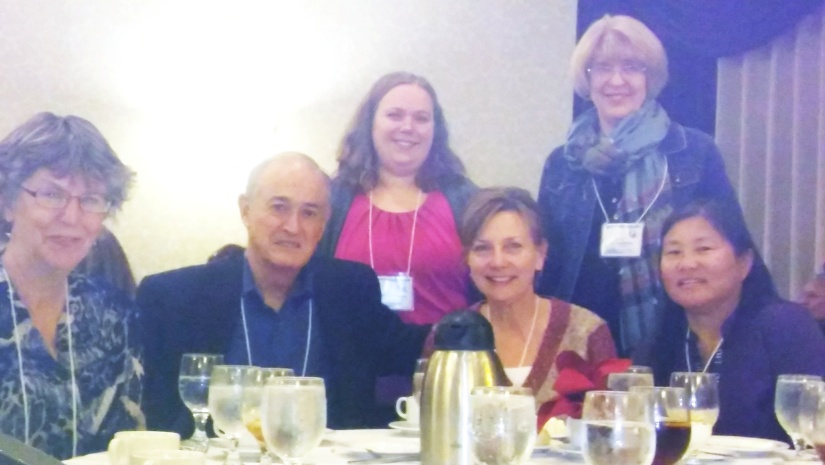 Pennsylvania is in its fourth month without a budget, with Gov. Wolf vetoing a stop-gap plan, saying it would just delay progress toward his top priority: adequate and equitable education funding. LAMPa’s network continues to urge lawmakers to approve the fair formula and fund it with a budget that adequately addresses need.
Pennsylvania is in its fourth month without a budget, with Gov. Wolf vetoing a stop-gap plan, saying it would just delay progress toward his top priority: adequate and equitable education funding. LAMPa’s network continues to urge lawmakers to approve the fair formula and fund it with a budget that adequately addresses need.
Congregations around Pennsylvania filled out postcards on school funding and child nutrition as an advocacy action on “God’s work. Our hands.” Sunday.
LAMPa is recruiting and equipping Lutherans to testify on the state’s Clean Power Plan, including this testimony from the Rev. Paul Metzloff.
 Tracey participated in the kickoff of a new Welcoming Community in York and the start of the 100 Women/100 Mile March from York’s immigration detention facility to Washington, D.C., protesting family detention.
Tracey participated in the kickoff of a new Welcoming Community in York and the start of the 100 Women/100 Mile March from York’s immigration detention facility to Washington, D.C., protesting family detention.
LAMPa staff accompanied state grassroots leaders to the ELCA advocacy convening in Washington, D.C., meeting with legislative staff on federal policy.
 Staff worked with the Gettysburg and Philadelphia seminaries about collaboration on Lutheran Day in the Capitol 2016. It will be part of Gettysburg’s Spring Academy with focus on intersections of faith, science and action.
Staff worked with the Gettysburg and Philadelphia seminaries about collaboration on Lutheran Day in the Capitol 2016. It will be part of Gettysburg’s Spring Academy with focus on intersections of faith, science and action.
Our Policy Council held their retreat at Susquehanna University, kicking off with a kayak trip on the Susquehanna River. Playmobil Luther came too!
____________________
Virginia
Charles Swadley, Virginia Interfaith Center for Public Policy
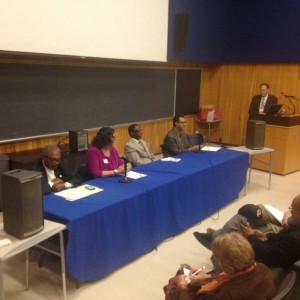 HEALTH CARE: Our Virginia Consumer Voices for Health Care (VCV) program and Northern Virginia Chapter produced a “Medicaid Expansion: Who Benefits” forum in Arlington in partnership with the League of Women Voters. The forum included elected officials and was the first joint function of the League of Women Voters of Falls Church and the Northern Virginia and Fairfax Chamber of Commerce. Prospects are improving with statewide chamber of commerce support for Medicaid expansion. VCV will be producing multiple “Call to Action: Health Care Access as a Moral Imperative” events this month around the state (Norfolk, Newport News and Roanoke). VCV (http://www.vaconsumervoices.org/) has been actively increasing its social media outreach to promote closing the coverage gap during the general assembly session that begins in January 2016. Health care policy content is developed and distributed to thousands of followers in a weekly roundup.
HEALTH CARE: Our Virginia Consumer Voices for Health Care (VCV) program and Northern Virginia Chapter produced a “Medicaid Expansion: Who Benefits” forum in Arlington in partnership with the League of Women Voters. The forum included elected officials and was the first joint function of the League of Women Voters of Falls Church and the Northern Virginia and Fairfax Chamber of Commerce. Prospects are improving with statewide chamber of commerce support for Medicaid expansion. VCV will be producing multiple “Call to Action: Health Care Access as a Moral Imperative” events this month around the state (Norfolk, Newport News and Roanoke). VCV (http://www.vaconsumervoices.org/) has been actively increasing its social media outreach to promote closing the coverage gap during the general assembly session that begins in January 2016. Health care policy content is developed and distributed to thousands of followers in a weekly roundup.
HUNGER: The Center is planning a Hunger Summit with the ELCA Virginia Synod and the Virginia Council of Churches that will be held in Richmond in November. We will producing 10+ congregation-based Social Justice University trainings for advocacy action on hunger, climate and others issues across the state as part of coordinated organizing efforts with our statewide chapter network. Also, VICPP’s Northern Piedmont Chapter is producing a hunger awareness event “Setting the Table: An Interfaith Event on Ending Hunger” at Germanna’s Daniel Technology Center in Culpeper, Va.
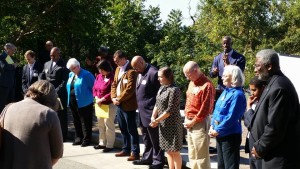 GUN VIOLENCE PREVENTION AND IMMIGRATION: The Center has initiated policy development ministries in gun violence prevention and immigration rights with grant support provided to our seminarian and public policy fellow, Lana Heath de Martinez. Lana attended the sixth-annual Virginia Immigrant Advocates Summit of the Virginia Coalition of Latino Organizations and is preparing to work on legislative and policy issues now confronting immigrant communities in Virginia, including closing the coverage gap with Medicaid expansion and access to driver’s licenses for immigrants.
GUN VIOLENCE PREVENTION AND IMMIGRATION: The Center has initiated policy development ministries in gun violence prevention and immigration rights with grant support provided to our seminarian and public policy fellow, Lana Heath de Martinez. Lana attended the sixth-annual Virginia Immigrant Advocates Summit of the Virginia Coalition of Latino Organizations and is preparing to work on legislative and policy issues now confronting immigrant communities in Virginia, including closing the coverage gap with Medicaid expansion and access to driver’s licenses for immigrants.
CREATION CARE: VICPP is co-sponsoring an event with the Chesapeake Bay Foundation called “Living Waters,” which will organize statewide advocates in policy development efforts to preserve clean water in the bay. See our new video of our amazing collaborators and chapter members helping VICPP put its faith in action at http://tinyurl.com/createjustice.
____________________
Washington
Paul Benz, Faith Action Network
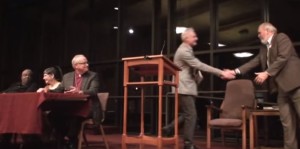 At the Bishops’ Advocacy Convening in Washington, D.C., Faith Action Network (FAN) was privileged to join all three of our ELCA bishops, who were in attendance. FAN was able to secure meetings with seven of our 10 House members, and one of our U.S. senators. The bishops were very engaged in presenting issues of food and hunger (especially Child Nutrition Reauthorization and the Global Food Security Act), the renewal of the Columbia River Treaty, and federal recognition for the Duwamish Tribe. Follow-up with the staff of those offices will be the next step.
At the Bishops’ Advocacy Convening in Washington, D.C., Faith Action Network (FAN) was privileged to join all three of our ELCA bishops, who were in attendance. FAN was able to secure meetings with seven of our 10 House members, and one of our U.S. senators. The bishops were very engaged in presenting issues of food and hunger (especially Child Nutrition Reauthorization and the Global Food Security Act), the renewal of the Columbia River Treaty, and federal recognition for the Duwamish Tribe. Follow-up with the staff of those offices will be the next step.
FAN convened interfaith leaders for lunch with Gov. Jay Inslee for conversation about his recently released rulemaking process to curb C02 emissions by our state’s 30 largest emitters. The past legislative session did nothing about meeting our state’s mandated C02 emission goals. Eleven religious leaders of many faith traditions attended and have since issueda statement.
FAN is sponsoring two forums on taxation called “What Kind of State Do You Want to Live In? Conversation and mobilization about our state’s regressive tax structure.” ELCA Bishop Kirby Unti will be on one of the panels of local religious leaders.
FAN is preparing for another annual fundraising dinner on Nov. 15 with the theme “Yes We Can!” Our guest speaker will be the Rev. Carey Anderson, senior minister of Seattle’s historic First AME Church. He will speak on the efforts needed to combat the racial injustices affecting our local communities and nation. To learn more about the event or to register, go toFANWA.org.
____________________
Wisconsin
Cindy Crane, Lutheran Office for Public Policy in Wisconsin
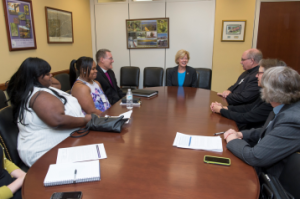 LUTHERAN AND EPISCOPAL ADVOCACY CONVENING SEPT. 22-24 IN WASHINGTON, D.C.: (Left) Visiting Sen. Tammy Baldwin are Melissa and Marquitta Smith of Hephatha Lutheran Church of the Greater Milwaukee Area Synod, Bishop Jerry Mansholt of the East Central Synod of Wisconsin, Bishop Jim Arends of the La Crosse Area Synod, Bishop Mary Froiland of the South-Central Synod of Wisconsin, and LOPPW’s director, Cindy Crane.
LUTHERAN AND EPISCOPAL ADVOCACY CONVENING SEPT. 22-24 IN WASHINGTON, D.C.: (Left) Visiting Sen. Tammy Baldwin are Melissa and Marquitta Smith of Hephatha Lutheran Church of the Greater Milwaukee Area Synod, Bishop Jerry Mansholt of the East Central Synod of Wisconsin, Bishop Jim Arends of the La Crosse Area Synod, Bishop Mary Froiland of the South-Central Synod of Wisconsin, and LOPPW’s director, Cindy Crane.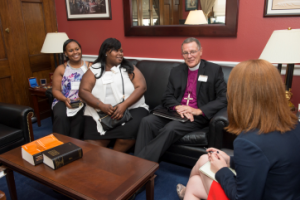
(Right) Visiting U.S. Rep. Reid Ribble’s office are Marquitta and Melissa Smith and Bishop Jerry Mansholt.
LOPPW RETREAT: We held an all-day LOPPW Advisory Council/Staff Retreat in Marathon to discuss pressing issues related to hunger in the communities of the council members, hone in our priorities, and make plans for the upcoming months.
ANTI-TRAFFICKING: Our task force met in Rice Lake to discuss upcoming legislation and begin planning conferences around the state. We are thankful for a grant from the Women of the ELCA to help fund the events.
CONTACT WITH STATE LEGISLATORS: LOPPW’s director was in contact with legislators about the bill to return 17-year-old non-violent, first-time offenders to the juvenile justice system, the Safe Harbor Bill, redistricting, and the possible dismantling of the Government Accountability Board.
INTERNS: The director interviewed a UW-Madison student and a recent graduate of UW-Madison for internship positions at LOPPW and will gladly welcome both. She has begun creating work plan for them. They will begin their internships in October.
____________________
What advocacy efforts are going on in your synod or state? We want to hear about it!


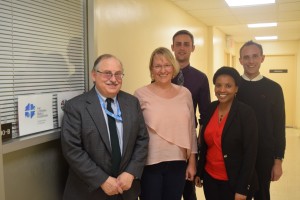 policies in states, maintain strong advocacy surrounding solidarity, and provide a special focus on women and children. To learn more about the ELCA’s efforts in the migration crisis, click
policies in states, maintain strong advocacy surrounding solidarity, and provide a special focus on women and children. To learn more about the ELCA’s efforts in the migration crisis, click 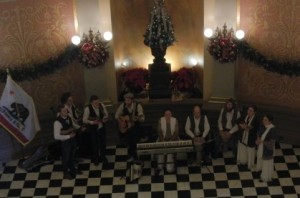 The deadline for Gov. Jerry Brown’s action on 2015 legislation passed on Oct. 11, and LOPP-CA was disappointed in the veto of AB 47 (see previous update) that would have accelerated expansion of state preschool to more children from low-income families. Citing budget pressures in the absence of action by the special legislative session on health care funding, he also vetoed an LOPP-CA supported bill expanding the state low-income housing tax credit, which helps leverage federal credits.
The deadline for Gov. Jerry Brown’s action on 2015 legislation passed on Oct. 11, and LOPP-CA was disappointed in the veto of AB 47 (see previous update) that would have accelerated expansion of state preschool to more children from low-income families. Citing budget pressures in the absence of action by the special legislative session on health care funding, he also vetoed an LOPP-CA supported bill expanding the state low-income housing tax credit, which helps leverage federal credits.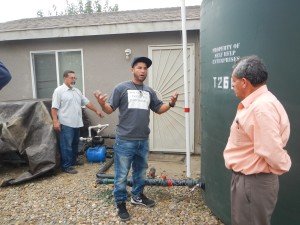 the Behavior, Energy, and Climate Change Conference, with energy scientist and Lutheran Dr. Kristin Heinemeier of UC Davis; and displayed and spoke briefly at the Sierra Pacific Synod Professional Leadership Conference in Monterey.
the Behavior, Energy, and Climate Change Conference, with energy scientist and Lutheran Dr. Kristin Heinemeier of UC Davis; and displayed and spoke briefly at the Sierra Pacific Synod Professional Leadership Conference in Monterey. AFFORDABLE HOUSING: Lutheran Advocacy Ministry-Colorado was present at the 2015 Housing Colorado Now! Conference in Beaver Creek, meeting with policy-makers and other affordable housing advocates to develop strategies for housing low- and extremely low-income families in Colorado. The critical lack of affordable housing touches all corners of Colorado, and several speakers at the conference addressed issues anticipated in the next legislative session of the Colorado General Assembly, including rental vouchers and a renewal of the state Low Income Housing Tax Credit.
AFFORDABLE HOUSING: Lutheran Advocacy Ministry-Colorado was present at the 2015 Housing Colorado Now! Conference in Beaver Creek, meeting with policy-makers and other affordable housing advocates to develop strategies for housing low- and extremely low-income families in Colorado. The critical lack of affordable housing touches all corners of Colorado, and several speakers at the conference addressed issues anticipated in the next legislative session of the Colorado General Assembly, including rental vouchers and a renewal of the state Low Income Housing Tax Credit.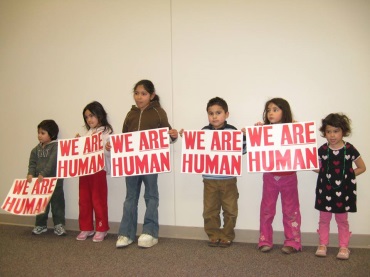 ELIMINATION OF POVERTY: Lutheran Advocacy-Il is part of the Illinois Commission on the Elimination of Poverty. The commission is an independent body focused on eliminating poverty in our state in a manner consistent with international human rights standards. As such, the commission’s charge is twofold: 1) To create and monitor a specific, substantive, measurable strategic plan for cutting extreme poverty in Illinois; and 2) To offer advice and comment on state matters that may positively or negatively impact the state’s goal of ending poverty. Studies show that suburban poverty is growing in Illinois. In October the commission held public hearings around the state and we were able to hear directly from advocates and clients served by a broad section of suburban programs. Members of the public had the opportunity to provide their feedback and inform the work plan of the Commission. Click
ELIMINATION OF POVERTY: Lutheran Advocacy-Il is part of the Illinois Commission on the Elimination of Poverty. The commission is an independent body focused on eliminating poverty in our state in a manner consistent with international human rights standards. As such, the commission’s charge is twofold: 1) To create and monitor a specific, substantive, measurable strategic plan for cutting extreme poverty in Illinois; and 2) To offer advice and comment on state matters that may positively or negatively impact the state’s goal of ending poverty. Studies show that suburban poverty is growing in Illinois. In October the commission held public hearings around the state and we were able to hear directly from advocates and clients served by a broad section of suburban programs. Members of the public had the opportunity to provide their feedback and inform the work plan of the Commission. Click 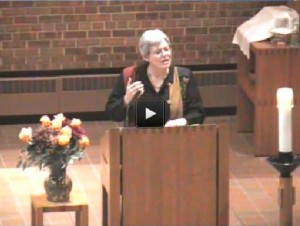 AFFORDABLE HOUSING/HOMELESSNESS: The lack of affordable rental housing is one of Minnesota’s greatest challenges, reiterated at a recent event with Julian Castro of the U.S. Department of Housing and Urban Development, and U.S. Rep. Keith Ellison. LA-MN continues to educate about homelessness, affordable housing, and impacts on food security.
AFFORDABLE HOUSING/HOMELESSNESS: The lack of affordable rental housing is one of Minnesota’s greatest challenges, reiterated at a recent event with Julian Castro of the U.S. Department of Housing and Urban Development, and U.S. Rep. Keith Ellison. LA-MN continues to educate about homelessness, affordable housing, and impacts on food security.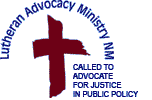 Legislative interim work continues as the interim committees work to develop their recommendations for the 2016 legislative session. LAM-NM is closely monitoring the work of the Legislative Finance Committee, which is developing the legislative budget proposal, as well as the Legislative Health and Human Services Committee, which considers legislation affecting low-income people in our state. Interim committees will wrap up their work in early December.
Legislative interim work continues as the interim committees work to develop their recommendations for the 2016 legislative session. LAM-NM is closely monitoring the work of the Legislative Finance Committee, which is developing the legislative budget proposal, as well as the Legislative Health and Human Services Committee, which considers legislation affecting low-income people in our state. Interim committees will wrap up their work in early December.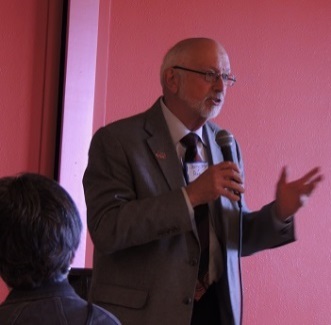 The LAM-NM Policy Committee met on Oct. 24 and adopted the
The LAM-NM Policy Committee met on Oct. 24 and adopted the 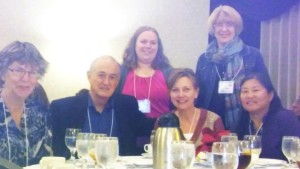 Associate Director Tracey DePasquale met with policy staff in the Department of Education to discuss trauma-responsive education and ways to build a statewide coalition to enact policy that reflects best practices. She also taught an adult forum at Christ Lutheran, Gettysburg, about disparities in education and as part of a series on inequality.
Associate Director Tracey DePasquale met with policy staff in the Department of Education to discuss trauma-responsive education and ways to build a statewide coalition to enact policy that reflects best practices. She also taught an adult forum at Christ Lutheran, Gettysburg, about disparities in education and as part of a series on inequality.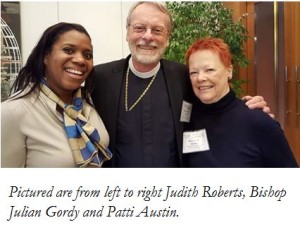 As one of the newest ministries of the Southeastern Synod, we have been busy building our network, organizing, and developing civic and ecumenical partners. We recently added links to the ELCA Advocacy Action Center and the LIRS Action Center to our synod website. We are currently planning an advocacy training event to be held in Atlanta in mid-January; our target date for promoting the training event is Nov. 6.
As one of the newest ministries of the Southeastern Synod, we have been busy building our network, organizing, and developing civic and ecumenical partners. We recently added links to the ELCA Advocacy Action Center and the LIRS Action Center to our synod website. We are currently planning an advocacy training event to be held in Atlanta in mid-January; our target date for promoting the training event is Nov. 6.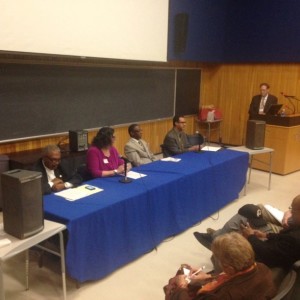 HEALTH CARE: Our Virginia Consumer Voices for Health Care program along with our Hampton Roads and New River Valley chapters recently produced forums in Norfolk and Blacksburg, respectively, titled, Health Care Access: a Moral Imperative. The forums included an interfaith panel of faith leaders, testimonies from those who suffered without health care, and a call to action to local faith communities to care for our neighbors through accepting federal Medicaid funds to close the coverage gap.
HEALTH CARE: Our Virginia Consumer Voices for Health Care program along with our Hampton Roads and New River Valley chapters recently produced forums in Norfolk and Blacksburg, respectively, titled, Health Care Access: a Moral Imperative. The forums included an interfaith panel of faith leaders, testimonies from those who suffered without health care, and a call to action to local faith communities to care for our neighbors through accepting federal Medicaid funds to close the coverage gap.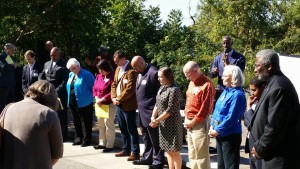 ECONOMIC JUSTICE AND HUNGER: VICPP’s Northern Piedmont Chapter produced a hunger awareness event, Setting the Table: An Interfaith Event on Ending Hunger, at Germanna’s Daniel Technology Center in Culpeper, Va. Center staff and members attended the 2015 Clergy Convocation in Richmond with the theme “Repair the breach, restore the streets.” The center is partnering in a Hunger Summit with the ELCA Virginia Synod and the Virginia Council of Churches, which will be held at Virginia Union University in Richmond on Nov. 18.
ECONOMIC JUSTICE AND HUNGER: VICPP’s Northern Piedmont Chapter produced a hunger awareness event, Setting the Table: An Interfaith Event on Ending Hunger, at Germanna’s Daniel Technology Center in Culpeper, Va. Center staff and members attended the 2015 Clergy Convocation in Richmond with the theme “Repair the breach, restore the streets.” The center is partnering in a Hunger Summit with the ELCA Virginia Synod and the Virginia Council of Churches, which will be held at Virginia Union University in Richmond on Nov. 18.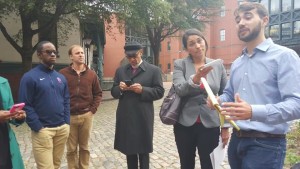 CREATION CARE: VICPP co-sponsored an event with the Chesapeake Bay Foundation titled “Living Waters” to organize statewide advocacy and policy development efforts to preserve clean water in the Chesapeake Bay and its watersheds. Important references to preserving God’s creation were made with many great examples of congregations putting their faith in action through greening programs and advocacy efforts. VICPP joined other creation-care advocacy organizations on the Interfaith Climate Change Impact Tour in Richmond organized by Creation Justice Ministries. VICPP will be propelling creation care from the mountains to the coast in its advocacy action work with congregations this fall.
CREATION CARE: VICPP co-sponsored an event with the Chesapeake Bay Foundation titled “Living Waters” to organize statewide advocacy and policy development efforts to preserve clean water in the Chesapeake Bay and its watersheds. Important references to preserving God’s creation were made with many great examples of congregations putting their faith in action through greening programs and advocacy efforts. VICPP joined other creation-care advocacy organizations on the Interfaith Climate Change Impact Tour in Richmond organized by Creation Justice Ministries. VICPP will be propelling creation care from the mountains to the coast in its advocacy action work with congregations this fall.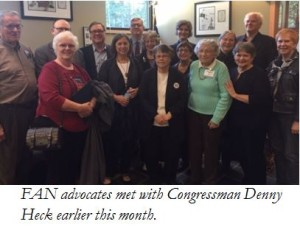 ELECTION: Faith Action Network (FAN) has an annual goal of organizing “interim” meetings between our advocates and their state legislators and members of congress/staff during summer and fall. So far, we have had 24 meetings with state legislators in 14 districts with 113 advocates, and 12 meetings with members of congress/staff from 10 districts with 50 advocates (including bishops).
ELECTION: Faith Action Network (FAN) has an annual goal of organizing “interim” meetings between our advocates and their state legislators and members of congress/staff during summer and fall. So far, we have had 24 meetings with state legislators in 14 districts with 113 advocates, and 12 meetings with members of congress/staff from 10 districts with 50 advocates (including bishops).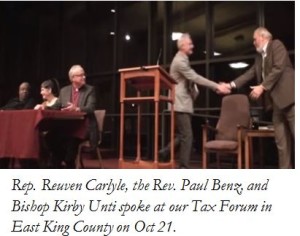 Episcopal Church will be our speaker, and we have invited Jennifer Pinckney (widow of the Rev. Pinckney) of Mother Emanuel AME in Charleston, S.C.
Episcopal Church will be our speaker, and we have invited Jennifer Pinckney (widow of the Rev. Pinckney) of Mother Emanuel AME in Charleston, S.C.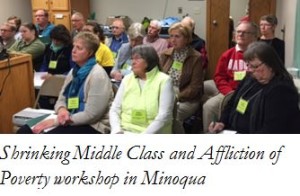 SYNOD TEAMS: LOPPW’s director met with Greater Milwaukee’s director for evangelical mission, The Rev. Sandy Chrostowski, about helping to start a hunger team. The director attended a workshop led by the Northern Great Lakes hunger team. LOPPW was involved in recruiting members for a Care for God’s Creation team for South-Central/LOPPW. The team will access World Hunger resources. The director has also met with the senior policy director of Clean Wisconsin about relevant state
SYNOD TEAMS: LOPPW’s director met with Greater Milwaukee’s director for evangelical mission, The Rev. Sandy Chrostowski, about helping to start a hunger team. The director attended a workshop led by the Northern Great Lakes hunger team. LOPPW was involved in recruiting members for a Care for God’s Creation team for South-Central/LOPPW. The team will access World Hunger resources. The director has also met with the senior policy director of Clean Wisconsin about relevant state 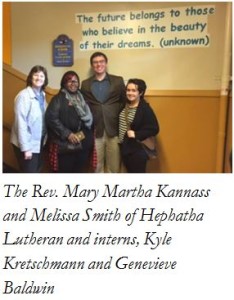 publicpolicy; LOPPW is now on the list of stakeholders for Wisconsin’s Clean Power Plan at the Deparment of Natural Resources. Wisconsin’s government has threatened to not implement any clean-power plan.
publicpolicy; LOPPW is now on the list of stakeholders for Wisconsin’s Clean Power Plan at the Deparment of Natural Resources. Wisconsin’s government has threatened to not implement any clean-power plan.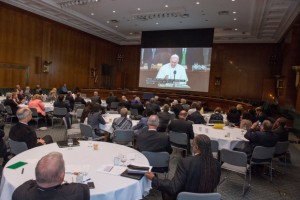
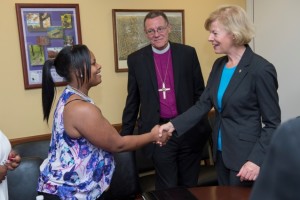
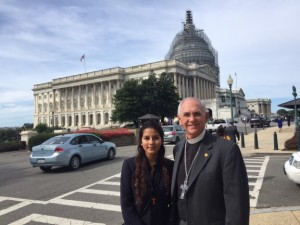
 OUTLOOK OF THE HIV AND AIDS EFFORTS AT THE UNITED NATIONS: During the 70th Session of the U.N. General Assembly, Nicholas Jaech with the Lutheran Office for World Community joined activists, health workers and governments to discuss long-term commitments to ending HIV and AIDS by 2030 – an objective outlined in the
OUTLOOK OF THE HIV AND AIDS EFFORTS AT THE UNITED NATIONS: During the 70th Session of the U.N. General Assembly, Nicholas Jaech with the Lutheran Office for World Community joined activists, health workers and governments to discuss long-term commitments to ending HIV and AIDS by 2030 – an objective outlined in the  U.N. TURNS 70 AND DISCUSSES REFORMS: The United Nations celebrates its 70thanniversary in October. During the annual General Debate in September, many heads of state used this anniversary occasion to highlight the achievements of the United Nations regarding its three pillars – peace and security, development, and human rights. Nevertheless, voices also gained momentum demanding reforms of current U.N. structures. A growing number of countries support the
U.N. TURNS 70 AND DISCUSSES REFORMS: The United Nations celebrates its 70thanniversary in October. During the annual General Debate in September, many heads of state used this anniversary occasion to highlight the achievements of the United Nations regarding its three pillars – peace and security, development, and human rights. Nevertheless, voices also gained momentum demanding reforms of current U.N. structures. A growing number of countries support the  state convened for the United Nations Sustainable Development Summit 2015 and adopted the 2030 Agenda for Sustainable Development,
state convened for the United Nations Sustainable Development Summit 2015 and adopted the 2030 Agenda for Sustainable Development,  After the DC Advocacy Convening and a stop in Kansas for The Land Institute’s Prairie Fest that included theologians Mary Evelyn Tucker of Yale and John Cobb of Claremont, LOPP-CA director Mark Carlson arrived in Sacramento after flight delays for a press event promoting AB 47, a bill that would move California toward serving all children from low-income families with state preschool by 2018. The bill is sitting on Gov. Brown’s desk with an Oct. 11 deadline for signature. Due to circumstances beyond his control, Mark was unable to respond to an invitation from Brown’s office to participate in the Los Angeles signing ceremony for
After the DC Advocacy Convening and a stop in Kansas for The Land Institute’s Prairie Fest that included theologians Mary Evelyn Tucker of Yale and John Cobb of Claremont, LOPP-CA director Mark Carlson arrived in Sacramento after flight delays for a press event promoting AB 47, a bill that would move California toward serving all children from low-income families with state preschool by 2018. The bill is sitting on Gov. Brown’s desk with an Oct. 11 deadline for signature. Due to circumstances beyond his control, Mark was unable to respond to an invitation from Brown’s office to participate in the Los Angeles signing ceremony for  advisory board. The bill’s outcome was very much in doubt, with 24/7 vigilers prepared to launch a hunger strike, “Starved for justice,” the following Monday. LOPP-CA worked with PICO California to secure St. John’s Lutheran Church for a
advisory board. The bill’s outcome was very much in doubt, with 24/7 vigilers prepared to launch a hunger strike, “Starved for justice,” the following Monday. LOPP-CA worked with PICO California to secure St. John’s Lutheran Church for a  ELCA ADVOCACY CONVENING: Alongside bishops, community leaders, and other state public policy office directors, LAM-CO Director Peter Severson was in Washington, D.C., for the ELCA Advocacy Convening. After watching Pope Francis’ address to a joint session of Congress from a streaming video feed in the Dirksen Senate Office Building, Peter joined LAM-NM Director Ruth Hoffman and Denver-based community leader Joy Waughtal in visiting congressional offices on Capitol Hill. Productive meetings were held with staffers for Sen. Cory Gardner, Colo., Sen. Tom Udall, N.M., and Rep. Ed Perlmutter, Colo. Peter and Ruth also acted as envoys for Rocky Mountain Synod Bishop Jim Gonia, offering personal greetings to Rep. Cynthia Lummis, Wyo., at the ELCA Advocacy Prayer Brunch (pictured right).
ELCA ADVOCACY CONVENING: Alongside bishops, community leaders, and other state public policy office directors, LAM-CO Director Peter Severson was in Washington, D.C., for the ELCA Advocacy Convening. After watching Pope Francis’ address to a joint session of Congress from a streaming video feed in the Dirksen Senate Office Building, Peter joined LAM-NM Director Ruth Hoffman and Denver-based community leader Joy Waughtal in visiting congressional offices on Capitol Hill. Productive meetings were held with staffers for Sen. Cory Gardner, Colo., Sen. Tom Udall, N.M., and Rep. Ed Perlmutter, Colo. Peter and Ruth also acted as envoys for Rocky Mountain Synod Bishop Jim Gonia, offering personal greetings to Rep. Cynthia Lummis, Wyo., at the ELCA Advocacy Prayer Brunch (pictured right). ELCA/EPISCOPAL ADVOCACY CONVENING: The convening included numerous speakers, the congressional address by Pope Francis via streaming video to a Senate office building, and advocacy. Representing Minnesota were Bishop Steve Delzer (Southeastern Minnesota Synod), the Rev. Margaret Kelly (Shobi’s Table), and LA-MN Director Tammy Walhof, who met with Rep. Tim Walz, Sen. Amy Klobuchar, and staff from the offices of Sen. Al Franken, and Rep. John Kline.
ELCA/EPISCOPAL ADVOCACY CONVENING: The convening included numerous speakers, the congressional address by Pope Francis via streaming video to a Senate office building, and advocacy. Representing Minnesota were Bishop Steve Delzer (Southeastern Minnesota Synod), the Rev. Margaret Kelly (Shobi’s Table), and LA-MN Director Tammy Walhof, who met with Rep. Tim Walz, Sen. Amy Klobuchar, and staff from the offices of Sen. Al Franken, and Rep. John Kline. LAM-NM recently led a forum at Our Savior Lutheran Church in Alamogordo, N.M. The forum explored poverty in New Mexico (which has among the highest rates of poverty in the nation) by putting together a household budget for a family
LAM-NM recently led a forum at Our Savior Lutheran Church in Alamogordo, N.M. The forum explored poverty in New Mexico (which has among the highest rates of poverty in the nation) by putting together a household budget for a family  that was headed by someone earning the New Mexico’s minimum wage of $7.50 per hour. The participants estimated the cost of housing, transportation, food, child care, health care, taxes and other expenses. The group quickly concluded that those costs were much more than the gross income of $1,300 per month. They discussed possible public policies that could address that income gap, such as increasing the minimum wage and making more affordable housing available.
that was headed by someone earning the New Mexico’s minimum wage of $7.50 per hour. The participants estimated the cost of housing, transportation, food, child care, health care, taxes and other expenses. The group quickly concluded that those costs were much more than the gross income of $1,300 per month. They discussed possible public policies that could address that income gap, such as increasing the minimum wage and making more affordable housing available. Pennsylvania is in its fourth month without a budget, with Gov. Wolf vetoing a stop-gap plan, saying it would just delay progress toward his top priority: adequate and equitable education funding. LAMPa’s network continues to urge lawmakers to approve the fair formula and fund it with a budget that adequately addresses need.
Pennsylvania is in its fourth month without a budget, with Gov. Wolf vetoing a stop-gap plan, saying it would just delay progress toward his top priority: adequate and equitable education funding. LAMPa’s network continues to urge lawmakers to approve the fair formula and fund it with a budget that adequately addresses need. Tracey participated in the kickoff of a new Welcoming Community in York and the start of the 100 Women/100 Mile March from York’s immigration detention facility to Washington, D.C., protesting family detention.
Tracey participated in the kickoff of a new Welcoming Community in York and the start of the 100 Women/100 Mile March from York’s immigration detention facility to Washington, D.C., protesting family detention. Staff worked with the Gettysburg and Philadelphia seminaries about collaboration on Lutheran Day in the Capitol 2016. It will be part of Gettysburg’s Spring Academy with focus on intersections of faith, science and action.
Staff worked with the Gettysburg and Philadelphia seminaries about collaboration on Lutheran Day in the Capitol 2016. It will be part of Gettysburg’s Spring Academy with focus on intersections of faith, science and action. HEALTH CARE: Our Virginia Consumer Voices for Health Care (VCV) program and Northern Virginia Chapter produced a “Medicaid Expansion: Who Benefits” forum in Arlington in partnership with the League of Women Voters. The forum included elected officials and was the first joint function of the League of Women Voters of Falls Church and the Northern Virginia and Fairfax Chamber of Commerce. Prospects are improving with statewide chamber of commerce support for Medicaid expansion. VCV will be producing multiple “Call to Action: Health Care Access as a Moral Imperative” events this month around the state (Norfolk, Newport News and Roanoke). VCV (
HEALTH CARE: Our Virginia Consumer Voices for Health Care (VCV) program and Northern Virginia Chapter produced a “Medicaid Expansion: Who Benefits” forum in Arlington in partnership with the League of Women Voters. The forum included elected officials and was the first joint function of the League of Women Voters of Falls Church and the Northern Virginia and Fairfax Chamber of Commerce. Prospects are improving with statewide chamber of commerce support for Medicaid expansion. VCV will be producing multiple “Call to Action: Health Care Access as a Moral Imperative” events this month around the state (Norfolk, Newport News and Roanoke). VCV ( GUN VIOLENCE PREVENTION AND IMMIGRATION: The Center has initiated policy development ministries in gun violence prevention and immigration rights with grant support provided to our seminarian and public policy fellow, Lana Heath de Martinez. Lana attended the sixth-annual Virginia Immigrant Advocates Summit of the Virginia Coalition of Latino Organizations and is preparing to work on legislative and policy issues now confronting immigrant communities in Virginia, including closing the coverage gap with Medicaid expansion and access to driver’s licenses for immigrants.
GUN VIOLENCE PREVENTION AND IMMIGRATION: The Center has initiated policy development ministries in gun violence prevention and immigration rights with grant support provided to our seminarian and public policy fellow, Lana Heath de Martinez. Lana attended the sixth-annual Virginia Immigrant Advocates Summit of the Virginia Coalition of Latino Organizations and is preparing to work on legislative and policy issues now confronting immigrant communities in Virginia, including closing the coverage gap with Medicaid expansion and access to driver’s licenses for immigrants. At the Bishops’ Advocacy Convening in Washington, D.C., Faith Action Network (FAN) was privileged to join all three of our ELCA bishops, who were in attendance. FAN was able to secure meetings with seven of our 10 House members, and one of our U.S. senators. The bishops were very engaged in presenting issues of food and hunger (especially Child Nutrition Reauthorization and the Global Food Security Act), the renewal of the Columbia River Treaty, and federal recognition for the Duwamish Tribe. Follow-up with the staff of those offices will be the next step.
At the Bishops’ Advocacy Convening in Washington, D.C., Faith Action Network (FAN) was privileged to join all three of our ELCA bishops, who were in attendance. FAN was able to secure meetings with seven of our 10 House members, and one of our U.S. senators. The bishops were very engaged in presenting issues of food and hunger (especially Child Nutrition Reauthorization and the Global Food Security Act), the renewal of the Columbia River Treaty, and federal recognition for the Duwamish Tribe. Follow-up with the staff of those offices will be the next step. LUTHERAN AND EPISCOPAL ADVOCACY CONVENING SEPT. 22-24 IN WASHINGTON, D.C.: (Left) Visiting Sen. Tammy Baldwin are Melissa and Marquitta Smith of Hephatha Lutheran Church of the Greater Milwaukee Area Synod, Bishop Jerry Mansholt of the East Central Synod of Wisconsin, Bishop Jim Arends of the La Crosse Area Synod, Bishop Mary Froiland of the South-Central Synod of Wisconsin, and LOPPW’s director, Cindy Crane.
LUTHERAN AND EPISCOPAL ADVOCACY CONVENING SEPT. 22-24 IN WASHINGTON, D.C.: (Left) Visiting Sen. Tammy Baldwin are Melissa and Marquitta Smith of Hephatha Lutheran Church of the Greater Milwaukee Area Synod, Bishop Jerry Mansholt of the East Central Synod of Wisconsin, Bishop Jim Arends of the La Crosse Area Synod, Bishop Mary Froiland of the South-Central Synod of Wisconsin, and LOPPW’s director, Cindy Crane.